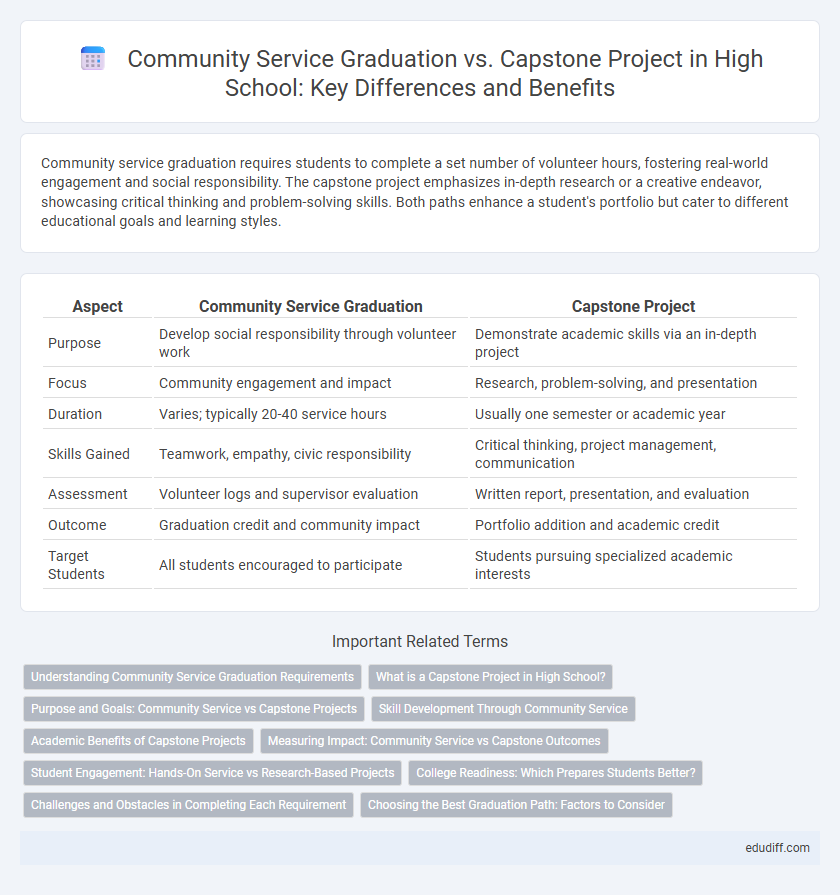Community service graduation requires students to complete a set number of volunteer hours, fostering real-world engagement and social responsibility. The capstone project emphasizes in-depth research or a creative endeavor, showcasing critical thinking and problem-solving skills. Both paths enhance a student's portfolio but cater to different educational goals and learning styles.
Table of Comparison
| Aspect | Community Service Graduation | Capstone Project |
|---|---|---|
| Purpose | Develop social responsibility through volunteer work | Demonstrate academic skills via an in-depth project |
| Focus | Community engagement and impact | Research, problem-solving, and presentation |
| Duration | Varies; typically 20-40 service hours | Usually one semester or academic year |
| Skills Gained | Teamwork, empathy, civic responsibility | Critical thinking, project management, communication |
| Assessment | Volunteer logs and supervisor evaluation | Written report, presentation, and evaluation |
| Outcome | Graduation credit and community impact | Portfolio addition and academic credit |
| Target Students | All students encouraged to participate | Students pursuing specialized academic interests |
Understanding Community Service Graduation Requirements
High school community service graduation requirements typically mandate a specific number of volunteer hours completed at approved organizations, emphasizing consistent engagement and real-world impact. Unlike a capstone project, which centers on in-depth research or a comprehensive presentation often tied to academic learning, community service focuses on active participation in service activities benefiting the local community. Understanding these distinctions ensures students meet graduation criteria by prioritizing hands-on volunteer work aligned with district guidelines rather than solely academic project deliverables.
What is a Capstone Project in High School?
A Capstone Project in high school is a comprehensive, research-based assignment that requires students to apply learned skills and knowledge to real-world challenges, often culminating in a detailed presentation or product. Unlike community service graduation requirements, which emphasize volunteer work and social engagement, capstone projects foster critical thinking, problem-solving, and subject mastery by integrating academic concepts across disciplines. This project serves as a significant academic milestone, demonstrating student readiness for college or career pathways through in-depth inquiry and practical application.
Purpose and Goals: Community Service vs Capstone Projects
Community Service Graduation aims to promote civic responsibility and empathy by engaging students in volunteer activities that address community needs, fostering personal growth and social awareness. Capstone Projects focus on demonstrating academic mastery and critical thinking through in-depth research or creative work, preparing students for higher education or career challenges. While community service emphasizes social impact and character development, capstone projects prioritize subject expertise and problem-solving skills.
Skill Development Through Community Service
Engaging in community service as part of high school graduation requirements fosters practical skills such as communication, teamwork, and problem-solving through real-world experiences. Unlike a Capstone Project, which primarily emphasizes research and academic synthesis, community service encourages empathy, civic responsibility, and adaptive learning in diverse social settings. These experiential skills not only enhance personal growth but also prepare students for future professional environments by developing interpersonal and leadership abilities.
Academic Benefits of Capstone Projects
Capstone projects in high school provide substantial academic benefits by fostering critical thinking, problem-solving, and research skills through comprehensive, interdisciplinary assignments. Unlike community service graduation requirements, capstone projects challenge students to integrate knowledge from multiple subjects into a cohesive final product that demonstrates mastery and depth of understanding. Completion of a capstone project enhances college readiness and strengthens college applications by showcasing a student's ability to manage complex tasks and present well-supported conclusions.
Measuring Impact: Community Service vs Capstone Outcomes
Community service graduation requirements typically measure impact through hours contributed and direct community feedback, emphasizing tangible benefits to local organizations. Capstone projects assess outcomes based on research quality, problem-solving skills, and the project's long-term effect on addressing a specific issue. Both approaches evaluate student growth but differ in focusing on service delivery versus academic and practical application.
Student Engagement: Hands-On Service vs Research-Based Projects
Community service graduation projects engage high school students through active participation in real-world volunteering opportunities, fostering empathy and social responsibility. Capstone projects emphasize research-based inquiry, critical thinking, and academic synthesis, encouraging students to explore topics deeply and present findings. Both approaches enhance student engagement but cater to different learning styles: experiential learning through hands-on service versus analytical learning via comprehensive research.
College Readiness: Which Prepares Students Better?
Community Service Graduation fosters real-world empathy and civic responsibility, enhancing interpersonal skills valued by colleges. The Capstone Project develops critical thinking, research abilities, and independent problem-solving, directly aligning with academic expectations in higher education. Both experiences build college readiness but differ: Community Service emphasizes social engagement, while Capstone emphasizes intellectual rigor.
Challenges and Obstacles in Completing Each Requirement
Completing community service graduation requirements often involves challenges such as coordinating volunteer hours with personal schedules and finding accessible opportunities aligned with student interests. Capstone projects present obstacles including extensive research demands, time management struggles, and the need for effective mentorship and resources. Both require overcoming logistical issues, but capstone projects tend to demand higher cognitive skills and sustained commitment over longer periods.
Choosing the Best Graduation Path: Factors to Consider
When choosing between Community Service Graduation and a Capstone Project, students should consider their personal interests, time commitment, and skill development goals. Community Service Graduation emphasizes real-world impact and social responsibility through volunteer work, while Capstone Projects focus on research, critical thinking, and showcasing academic skills. Evaluating the alignment of each path with future college or career aspirations helps determine the best graduation option.
Community Service Graduation vs Capstone Project Infographic

 edudiff.com
edudiff.com